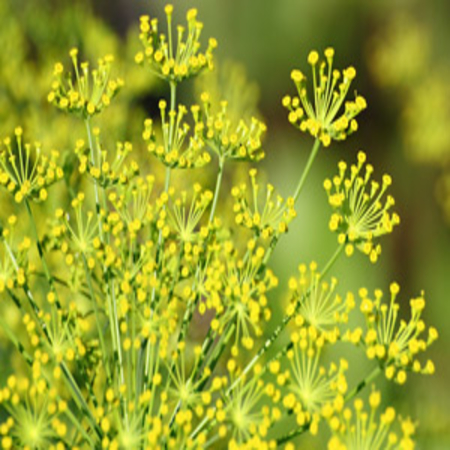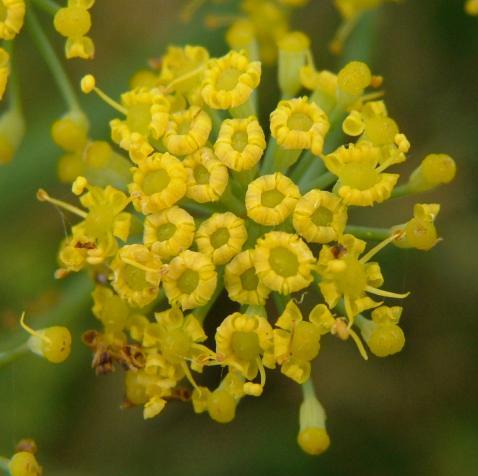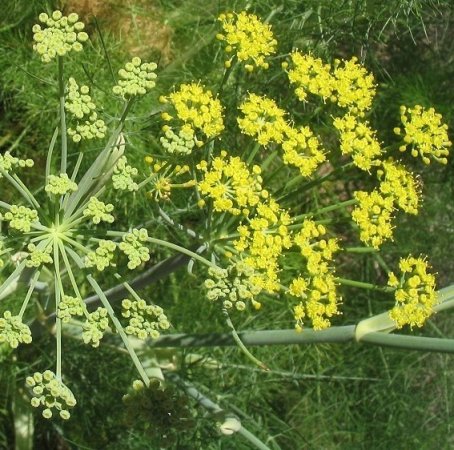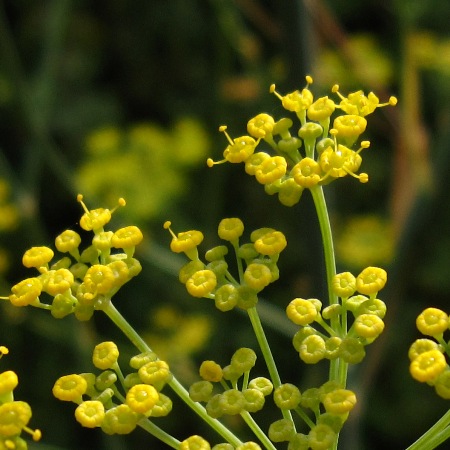





Botanical name Foeniculum vulgare dulce
Family Apiaceae
Source Seeds
Origin France
Processing Method Steam Distillation
Color/Consistency clear to pale yellow liquid.
Aromatic Summary / Note / Strength of Aroma A top note with a medium aroma, Fennel Sweet Essential Oil has a similar to that of black licorice.
Blends With Bergamot, Lavender, Frankincense and Rose.
Product Abstract
Sweet Fennel commonly used in kitchen Sweet Fennel oil is used to enhance the flavours of confectionary and we are aware of some medicinal properties as well, Sweet Fennel essential oil obtain by steam distillation. Fennel sweet essential oil can attributed to its properties as an antiseptic, antispasmodic, aperitif, carminative, depurative, diuretic, emmenagogue, expectorant, galactagogue, laxative, stimulant, stomachic, splenic, tonic and vermifuge substance. It is also used for cosmetic purposes, especially as an ingredient in massage oils perfumes, toothpastes and soaps.
History
Fennel is native to southern Europe and the Mediterranean area. The name comes from the Greek word for "marathon" because the famous battle at Marathon (490 BC) against the Persians was fought on a field of Fennel. Pliny said that snakes casting off their skins ate Fennel to restore their eyesight.
Harvesting/Extraction Information
Fennel seeds were extracted steam distillation with supercritical carbon dioxide. Small-scale subsequent extractions of the same sample showed that the composition of volatile compounds was changed with the extension of extraction time and only principal volatile components were present in the last-extracted sample. Fennel oil was successfully fractionated into the essential oil rich and fatty oil rich products in pilot-scale apparatus using two separators in series.
Common Usage
Caution
An organic component called Trans Anethole, which present in fennel essential oil, boosts the production of the estrogen hormone. Although this is beneficial for lactating mothers, it is harmful for pregnant women and women with breast cancer or uterine cancer or tumor, since excess estrogen is the main cause of such cancers. In heavy doses, it may have narcotic effects and can result in convulsions, hallucinations and mental imbalance. People suffering from epilepsy or with a history of that condition should avoid using fennel essential oil.
Key constituents
(E)-Anethole 58.1–92.5%
(þ)-Limonene 0.2–21.0%
Fenchone 0.2–8.0%
Estragole 1.1–4.8%
a-Pinene 0.1–3.4%
a-Phellandrene 0.1–2.0%
(Z)-Anethole tr–0.7%
Quality Sweet fennel oil may be adulterated with monoterpene hydrocarbons such as limonene, and with synthetic anethole, which usually contains the more toxic (Z)- isomer. Bitter fennel oil may be passed off as sweet fennel oil.
Safety summary
Hazards Drug interaction; reproductive hormone modulation; potentially carcinogenic, based on estragole content; may inhibit blood clotting; skin sensitization if oxidized.
Contraindications (all routes) Pregnancy, breastfeeding, endometriosis, estrogen-dependent cancers, children under five years of age.
Cautions (oral) Diabetes medication, anticoagulant medication, major surgery, peptic ulcer, hemophilia, other bleeding disorders.
Maximum adult daily oral dose 73 mg
Maximum dermal use level
EU No limit
IFRA 0.2%
Tisserand & Young 2.5%
Our safety advice
We recommend an oral maximum of 73 mg and a dermal maximum of 2.5%, based on 4.8% estragole content with oral and dermal limits of 0.05 mg/kg and 0.12%.
Regulatory guidelines
The Commission E Monograph for fennel oil. recommends that it is not used in pregnancy, or “for infants and toddlers”. IFRA recommends a maximum dermal use level for estragole of 0.01% in leave-on or wash-off preparations for body and face. The EU does not restrict estragole.
Organ-specific effects
Systemic effects
Comments
Both (þ)-limonene and fennel oil induce glutathione synthesis, and (þ)-limonene is anticarcinogenic while estragole is carcinogenic. In the absence of any further information, sweet fennel oil should be treated as a potential carcinogen, because of its estragole content. There are four chemotypes of fennel, an anethole, a (þ)-limonene, an estragole and an estragole/fenchone, although only the anethole chemotype is used for commercial essential oil production. In an analysis of 30 anethole chemotype oils, the estragole content ranged from 2.0–4.3%. Anisaldehyde, an oxidation product of anethole, increases if the oil is improperly stored.